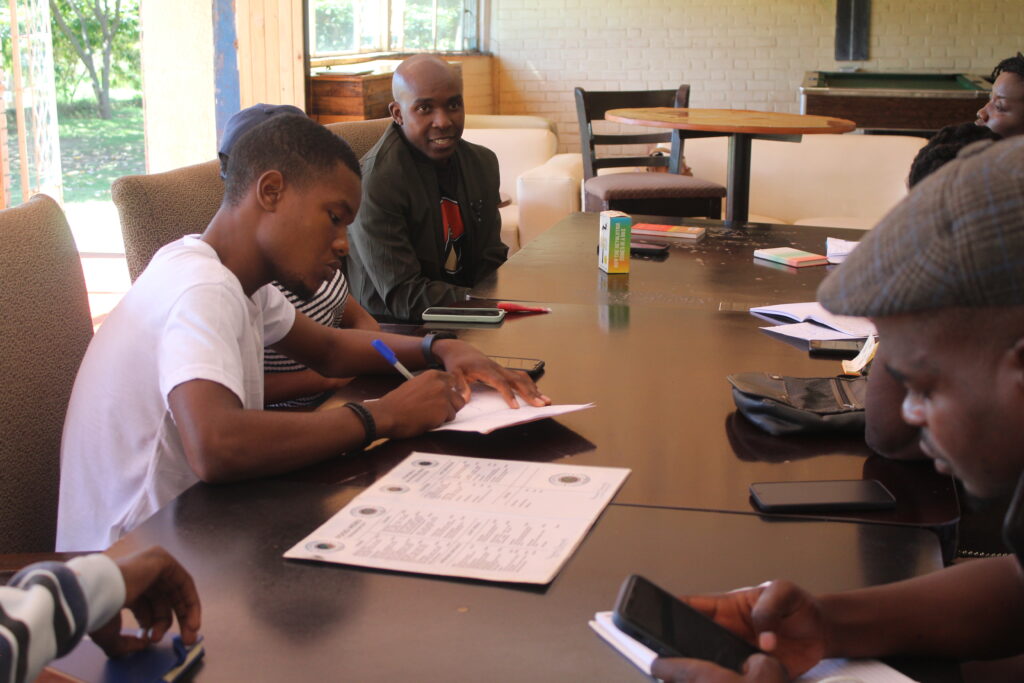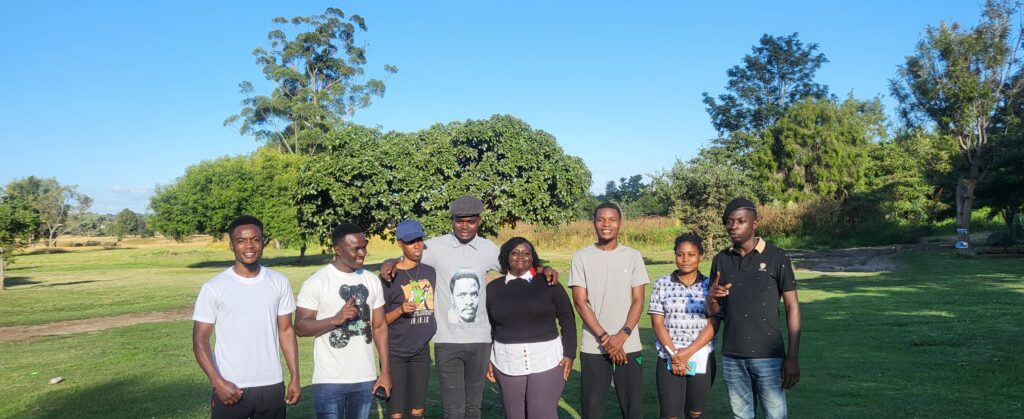Project: RUVIMBO – Building a Sustainable and Inclusive Youth Movement in Zimbabwe Organized by: Danske Studerendes Fællesråd in partnership with Zimbabwe National Students Union (ZINASU)
Main objective of trip
From April 12th to 20th, a team from the Danske Studerendes Fællesråd and ZINASU embarked on a research and learning visit to Nairobi, Kenya. This trip was part of the newly launched RUVIMBO project — a collaborative initiative exploring how we can build a safer, inclusive, and more sustainable youth movement in Zimbabwe. “Ruvimbo” means hope in Shona, and hope was truly the driving force behind our journey.
Kenya was selected for this trip because of its dynamic and resilient civil society, recent youth-led mobilizations such as the Gen Z protests, and shared structural challenges with Zimbabwe. The aim was to learn from Kenyan youth organizers, community actors, and civil society networks on four key themes:
- Governance and accountability
- Feminist leadership and gender mainstreaming
- Climate action
- Safety and activism
Kenya mirrors, in many ways, the challenging, corrupt, and insecure environment that ZINASU has to navigate back home in Zim. Last year, Kenyan youths mobilized during the gen-z protests and took to the streets against the finance bill. Kenya mirrors many of the challenges that students face in Zimbabwe — from political insecurity to corruption — yet continues to show incredible examples of courage, resistance, and community-centered organizing.
Key take-aways from research travel
Our time in Kenya offered both deep inspiration and valuable learning moments — not just from those we met, but from the experience of organizing and participating in the research travel itself.
Last year’s Gen-Z protests in Kenya, where youth mobilized across the country against the Finance Bill, stood as a powerful reminder of what is possible when young people organize with clarity and courage. In conversations across Nairobi, we were repeatedly reminded of the importance of resilience, of centering community, and of building movements that ultimately serve the people — not the powerful.
We learned that the way we work matters just as much as what we fight for. Key insights include:
- Participatory Action Research (PAR) is a crucial tool for justice work. It taught us that the collection of knowledge must begin in communities, not in institutions. When we engage people directly in shaping the questions and the analysis, research becomes a tool for collective empowerment, not just data-gathering. Tackling structural violence requires that we first understand it — and that requires building spaces for communities to share lived realities, not just statistics. This also means we must build clear communication strategies that are accessible for those that we seek to have involved and work with and for.
- Strong organizations are built on clear structures, shared knowledge, and decentralized leadership. We were reminded that knowledge must flow throughout an organization — not stay concentrated at the top. We must also remember to continue spreading the knowledge internally so that everyone understand, is empowered and equipped to make decisions on behalf of the organization and partnership.
- Decolonial strategies and inclusive communication are essential. To reach rural areas and marginalized voices, we must create messaging that is simple, strategic, and accessible — backed by solid dissemination plans and trust-based organizing.
- Safety and inclusion are foundational to movement building. We must actively create spaces that feel secure, where more people can engage meaningfully and sustainability.
However, the trip also revealed internal challenges that we take forward as lessons:
- We experienced time constraints and limited capacity for thorough documentation during the visit making it difficult to stay on track on key measurements of impact and learnings
- There was a lack of clear role distribution, which affected coordination and follow-up — particularly in involving ZINASU more meaningfully in the planning phases.
- Financial and logistical management could be improved with more joint preparation and aligned expectations.
- Moving forward, we will implement more frequent online check-ins, better alignment meetings, and clearer shared responsibilities across partners.
This research travel and partnership meeting reaffirmed that partnerships must constantly reflect on who we are trying to reach, and how we structure our work to serve that goal. Clear communication, joint decision-making, and honest self-reflection will be central to how we grow the RUVIMBO partnership.
Actors involved during research travel
- Associate professor and anthropologist, Jakob Rasmussen
- Champions for SDGs together with Arnold Gekonge
- Noelle Museshi
- Polycom Girls
- Geoffrey Mboya
- Esther Muthoga
- Wairimu Manyara
Recommendations found throughout research travel for RUVIMBO
From all these engagements, we distilled some core lessons for our work back in Zimbabwe:
Community first: Organizing must be for the community, not for funders or visibility. Real power grows from listening and responding to people’s needs.
Safety matters: We must build structures that support safe, sustainable activism, especially in environments of repression.
Language is power: Break down complex ideas — from constitutional law to climate policy — into everyday language that mobilizes, not alienates.
Documentation and data: Research and evidence-based advocacy are key. Without statistics, stories, and grounded case studies, we cannot hold systems accountable.
Solidarity is strength: Regional and continental alliances — like AASU, SADC Youth, and Pan-African networks — are essential for knowledge sharing and mutual support.
Mentioned strategies and practices
Participatory Action Research (PAR)
We began our learning with Professor Jakob Rasmussen, who introduced us to Participatory Action Research (PAR) as a model for activist-driven, reflective, and inclusive community engagement. He emphasized that participation means more than inclusion — it’s about ownership, recognition, and transformation. His approach set the tone for the week: gather knowledge, analyze it critically, and let action be shaped by those most affected.
Youth Leadership & Civic Engagement
In conversations with Nemo from the Danish Embassy Youth team, we were reminded that our constituencies are our greatest asset. We need to build youth leadership from within communities, using what we already know and the relationships we already have. Her message was clear: to be effective advocates, we must root ourselves in local realities and organize through trust.
Arnold Gekonge from Champions for SDGs challenged us to deepen our expertise in the areas we work in. He emphasized the importance of clear communication, SDG literacy, and sustained collaboration — particularly in the context of political education and peacebuilding.
Grassroots Organizing
Our visit to Mukuru Kwa Njenga, guided by Geoffrey Mboya, was a turning point for many of us. Walking through the community, we saw the power of grassroots organizing and the impact of 49 social justice centers across Nairobi. These hubs function not just as safe spaces but as centers of education, protest planning, and collective care. Geoffrey reminded us that effective activism starts where people are — not in abstract theories, but in lived realities.
At Polycom Girls, we learned how feminist leadership is built from the ground up. Their team emphasized using simple language, clear slogans, and cross-cutting alliances to communicate with communities. This approach ensures that even those in the most marginalized areas can understand and engage with justice work.
Noelle Museshi highlighted the importance of unified messaging: civil society actors working toward the same goals should show up together, rather than fragmenting their advocacy. Unity builds clarity, legitimacy, and momentum.
Conclusion
This trip was not just a research visit. It was a week of deep reflection, shared learning, and connection. Kenya gave us a glimpse into what is possible when movements are rooted in care, clarity, and courage. We returned home with new tools, new relationships, and renewed hope for what youth organizing can be.


